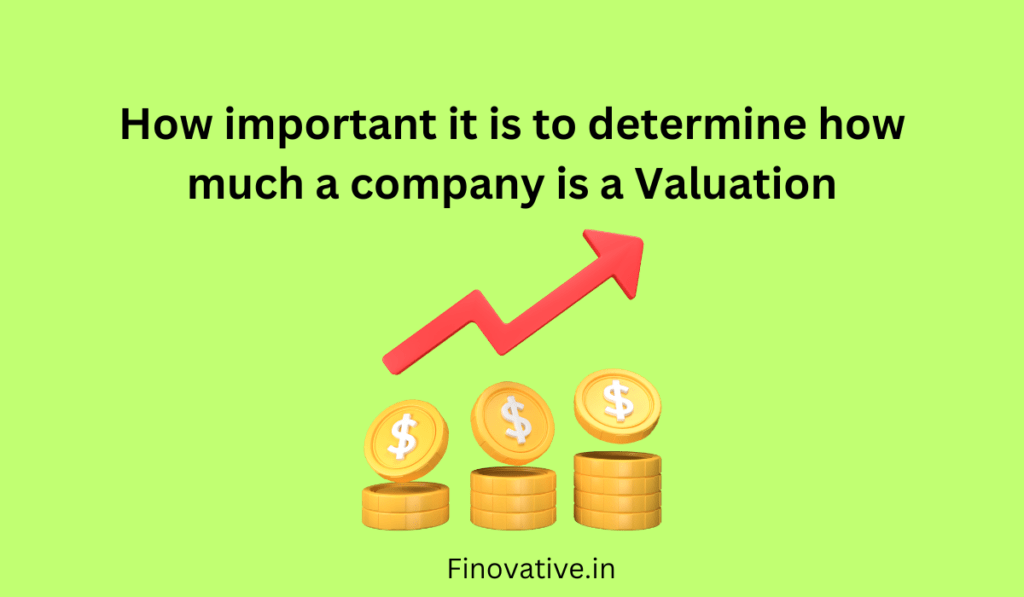Here we are sharing information on How important it is to determine how much a company is a Valuation?
- It’s important to know how much a company is worth for the following reasons:
- An investor’s valuation of a company helps them decide whether or not to invest in it. For example, an investor can figure out if the current stock price of a company is a good investment chance. You can also find out if a stock is overvalued, undervalued, or priced right.
- It helps you figure out the fair value of a company’s assets and liabilities, which is important for financial reporting.
- If a business owner needs money, lenders or venture capitalists will want to know the value of the business.
- If you are a partner in a business and want to know how much your share is worth.
This is a How to figure out how much a company is worth Using the method of business value.
Let’s look at an example of how to figure out how much a company is worth.
Let’s say that ABC Ltd and XYZ Ltd have a big share of the pharma business. Using the business value method, let’s compare how much each company is worth.
ABC Ltd. has a market value of Rs. 1 trillion, liabilities of Rs. 300 trillion, and cash or cash equivalents of Rs. 5 trillion.
So, the value of its business is 1,000 + 300 – 5 = Rs. 1,295 crore.
XYZ Ltd. has a market capitalization of Rs. 1,500 crore, liabilities of Rs. 850 crore, and cash or cash equivalents of Rs. 20 crore.
The value of XYZ Ltd’s business is 1,500 + 850 – 20 = Rs. 2,325 crore.
This means that: 1. The business value of XYZ Ltd is higher than that of ABC Ltd. 2. XYZ Ltd has more debts than ABC Ltd. Because of this, the risk and unpredictability are also higher.
How do you figure out what a company is worth?
Figuring out a company’s financial worth or fair value is called “valuation.” This process includes figuring out the business’s value based on financial and non-financial factors. Finding a company’s fair value can be useful for many things, such as financial reports, making investment decisions, planning strategies, raising money, merging, etc.
Different ways to figure out how much a company is worth?
There are a number of ways to figure out how much a company is worth. And choosing the right method relies on things like the type of business, the industry, the available financial information, and, most importantly, what the valuation is for. Here are some of the most popular ways to figure out how much a company is worth:
1. Market capitalisation
Market capitalisation is the most usual way to figure out how much a public company is worth. Through market capitalization, you can figure out how much a company is worth by multiplying the share price by the total number of shares.
Also Find out more about “Types of Market Capitalisation”
2. Discounted Cash Flows (DCF)
One of the most common ways to value something is with discounted cash flows. It figures out how much the future cash flows of a company are worth right now. It starts by making an estimate of a company’s expected cash flows over a certain time period. Then, it uses an appropriate discount rate to return those cash flows to their present value. This rate is the company’s Weighted Average Cost of Capital (WACC). When figuring out how much a business is worth, using discounted cash flow methods can help find out how well the company can make liquid assets or terminal cash flow.
In simple terms, it helps determine if the company’s present value, based on its expected future cash flows, is higher than its current value. But knowing if this projected present value is right can be hard. As a way to predict growth, discount rates rest on assumptions and could change.
3. Asset-based valuation
The Net Asset Value (NAV) of a company is used by this method to figure out how much it is worth. To figure out a company’s NAV, you add up all of its physical and intangible assets and subtract all of its liabilities. Companies with real assets often use this method, like those that make things or own property.
4. Enterprise value method
This method takes into account how a company’s stock, debt, and cash or cash equivalents are put together. Using the enterprise value way to figure out how much a company is worth, the formula is: Value = Debt + Equity – Cash.
Startup Valuation Process
The process of valuing a startup includes figuring out how much money a new business is worth. Valuation is important for many things, like getting investors, giving out stock options, discussing mergers and acquisitions, and figuring out how healthy a business is overall. Here’s a high-level look at how startups are valued:
Get to Know the Basics:
Learn the basics of what it means to value something. Key words include pre-money valuation, post-money valuation, dilution, equity, sales, profit, EBITDA (earnings before interest, taxes, depreciation, and amortization), and other financial metrics.
Choose the Right Valuation Methods:
Select Appropriate Valuation Methods: There are several valuation methods used for startups, and each has its advantages and limitations. Some common ways are:
- Market Multiple Approach:Using metrics like income, profit, or users to compare your startup to others in the same field.
- Discounted Cash Flow (DCF) Analysis: predicting future cash flows and using a discount rate to bring them down to their current value.
- Venture Capital Method: Estimating the company’s future value at the time of exit and working backward to find its present value.
- Scorecard Method: Evaluating different things, like the strength of the team, the market chance, the product, etc., and giving them points to come up with a value.
Collect Financial Information:
Get correct and up-to-date information about your startup’s finances. This includes income, expenses, assets, liabilities, projections, growth rates, and any other important financial metrics.
Analyze Market and business Trends:
Know your market and business. Investors will think about things like market size, growth prospects, competition, and barriers to entry.
Determine Risk Factors:
Make a list of the possible risks that your startup might face, such as market competition, regulatory problems, protecting intellectual property, and running the business.
Choose Comparable Companies:
For the market multiple method, find and study companies in your industry that are similar to yours and can be used as comparison points.
Calculate Valuation:
Once you have all the information you need and have chosen a valuation method, you can do the math to get an idea of how much your startup is worth.
Review and change:
Think about what advisors, teachers, and possible investors have to say. Be willing to change your estimate if new information or changes in the market make it necessary.
Present the Valuation:
If you want to get funding or do any financial transaction, you should be ready to show possible investors or stakeholders your valuation.


